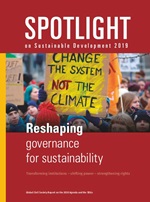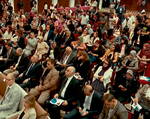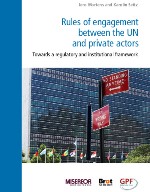Published on Wed, 2019-10-09 12:45
A debate on ‘The IMF and inequalities: tensions between structural adjustments and structural transformations’ will be held next October 17 at the IMF headquarters in Washington as a side event during the Spring meeting of the Bretton Woods institutions. A panel of civil society researchers and IMF representatives will debate around the contradictions between IMF-advised structural adjustments and the need for global socio-economic transformations. Discussants will draw on the 2019 Spotlight Report on Sustainable Development and propose ways forward for the Fund’s work to tackle inequalities and achieve the SDGs. |
Published on Wed, 2019-10-09 10:04
Women's and feminist organizations are increasingly involved in economic issues and are actively participating in global resistances that challenge the implications of financialization, the concentration of wealth, the rise of inequality and the increasing power of corporations, argues Corina Rodríguez Enríquez, from Development Alternatives with Women for a New Era (DAWN) in a chapter of the recently launched Spotlight report. The advance of the women's agenda, as well as many years of advocacy work, has also permeated the agendas of multilateral institutions and the spaces of the multi-stakeholder global governance. However, both the approach that these institutions have on ‘gender issues’, as well as the space that they allow for the articulation of women’s voices are controversial and limited. |
Published on Mon, 2019-10-07 12:13
For the first time since 2003, Baghdad hosted last August a regional conference on gender issues, co-organized by the government, civil society and UN agencies. The Forum discussed the role of the various institutional mechanisms for women operating in the Arab region and promoted the establishment of an independent national body for women's empowerment in Iraq. Reporting on the debate, the Iraqi Al-Amal association concludes that ‘effective institutional mechanisms are required to confront the challenges that hinder women's rights in the Arab region, especially during and after conflicts, and to confront the Israeli occupation, terrorism, extremism, religious radicalism, patriarchal mentality, tribal norms and corruption, and policies of exclusion and marginalization of qualified and active women in decision-making positions.’ |
Published on Mon, 2019-10-07 11:29
Global multi-stakeholder partnerships and initiatives between public and private actors, which move beyond traditional nation-state multilateralism, are now perceived as the future of international cooperation. The UN is already involved in hundreds of partnership initiatives with individual companies and business associations. ‘Rules of engagement between the UN and private actors,’ a paper by Jens Martens and Karolin Seit from Global Policy Forum, demonstrates that the existing guidelines are weak and highly heterogeneous. Effective and comprehensive rules for such cooperation are still missing. The non-regulated engagement between the UN and the private sector could result in a loss of reputation, increased influence by private actors on political decision-making, and could divert scarce public resources away from UN goals. |
Published on Tue, 2019-10-01 10:28
Last week, the UN General Assembly 74th Session’s first full week in New York City met amid High-level meetings on climate, health, the SDGs, financing for development, and Small Island Developing States. Over 90 Heads of State or Government convened at UN Headquarters for this political moment, described by the outgoing President of the General Assembly, María Fernanda Espinosa Garcés as “inextricably linked strands of DNA that make up our ‘blueprint’ for the world”. Integral to this year’s session has been the heightened participation of corporate, philanthropic and financial actors in both the official, High-level meetings themselves and a variety of concurrent meetings including the SDG Business Forum, the World Economic Forum’s Sustainable Development Impact Summit, UN Global Compact events, the Bloomberg Global Business Forum and the Bill and Melinda Gates Foundation Goalkeepers event. |
SUSCRIBE TO OUR NEWSLETTER







